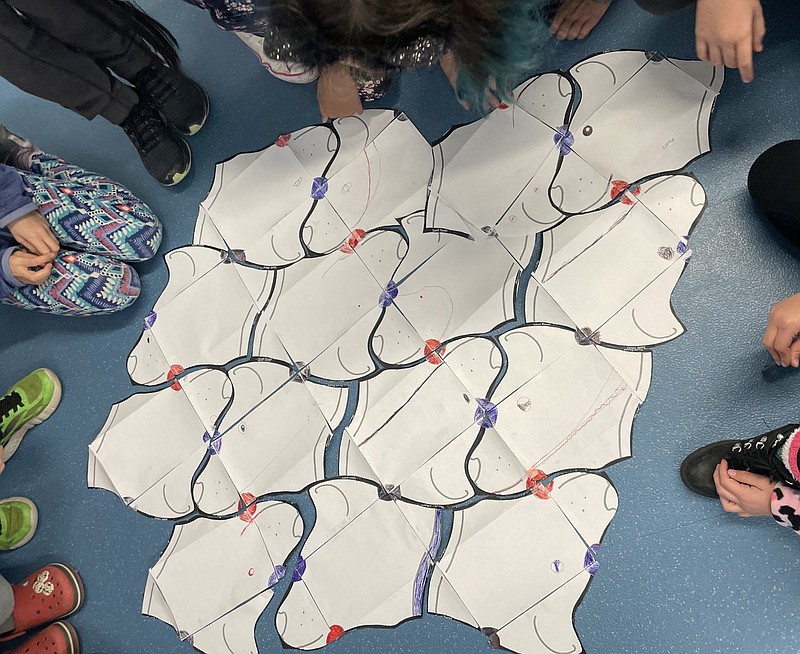FAYETTEVILLE -- A $25,000 prize for developing an innovative math lesson plan has been awarded to Chaim Goodman-Strauss, a math professor at the University of Arkansas, Fayetteville.
Goodman-Strauss won the 2021 Rosenthal Prize for Innovation and Inspiration in Math Teaching, a national contest held annually since 2012 to identify creative and hands-on lesson plans for students in upper elementary and middle school grades.
"He put together a wonderful lesson plan that covers things that I think are engaging for kids, that they would like to do and enjoy doing," said Cindy Lawrence, executive director and chief executive officer of the National Museum of Mathematics, which awards the prizes.
Eighth- and ninth-grade students at Thaden School in Bentonville and at the Don Tyson School of Innovation in Springdale have been taught the new lesson, Goodman-Strauss said.
"I was able to prototype the lesson and try it out with them," Goodman-Strauss said. "It really, really works. It works so much better than I had really even hoped."
The lesson involves folding paper with a printed design into an envelope shape and then making cuts along one side.
Students in the group activity then unfold their envelopes, having created tiles they can fit together in a symmetrical pattern. This means that at certain points, the pattern of tiles can be semi-rotated without any features changing.
Points of rotation match corners of the original envelope, with the activity demonstrating the connection between the type of symmetry on display and the mathematical concept of a surface, Goodman-Strauss explained.
"It's obviously accessible, but it's also deep and it connects to a lot of very advanced mathematics," Goodman-Strauss said.
The contest aims to reward educators and share the prize-winning lessons, Lawrence said.
"The idea is for other teachers around the world to be able to see that and go, 'Oh, I can do that in my classroom,'" Lawrence said. The museum's website posts the winning lesson plans at momath.org/rosenthal-prize.
Lawrence said money for the prizes awarded by the museum comes from donor Saul Rosenthal, president of Greenwich, Conn.-based Oxford Funds, LLC, an investment advising company. Rosenthal is also a member of the New York museum's board of trustees.
Goodman-Strauss said that several years ago he helped with an exhibit at the museum, which describes itself as the only math museum in North America.
He said he viewed the contest as a way to possibly get his concept for a lesson into classrooms.
Upon learning that he won, "I was very, very happy, but also very glad to share this idea," Goodman-Strauss said.
Sharing math concepts through outreach and teaching has been a longtime passion, Goodman-Strauss said, including a past collaboration with Fayetteville radio station KUAF for a segment known as Math Factor.
Goodman-Strauss has been a UA faculty member since 1994. He noted that formal rewards and recognition in his career mostly come from his work as a mathematics researcher.
"It's just so meaningful to have some validation for this work," Goodman-Strauss said of the contest rewarding his ideas as an educator.
Students in the upper elementary and middle school grades are "at a foundational age where attitudes are set," Goodman-Strauss said.
Lawrence said the grade range for the lesson plans reflects a reality that perceptions of what's "cool" change after children's early elementary years.
[DOCUMENT: Read an excerpt from the math lesson on symmetry » arkansasonline.com/110toot011/]
Being good at math becomes "somewhat less cool" in those middle years, Lawrence said, so the prize works to help teachers with engaging their students.
Entries to the contest are first reviewed by a two-person review team: a teacher and also someone with an doctorate in mathematics, Lawrence said.
Finalists are asked to submit an unedited video of the lesson being taught in a classroom, along with a more detailed lesson plan, Lawrence said.
A larger panel then reviews the more detailed submissions to reach a consensus on the winners, Lawrence said. The 2021 Rosenthal Prize also named second place, third place and honorable mention award winners, with each receiving a cash prize.
The video submitted by Goodman-Strauss showed mathematics as a group activity, Lawrence said.
"Math is highly collaborative. When you work together, you go so much farther than any person working alone," Lawrence said.

